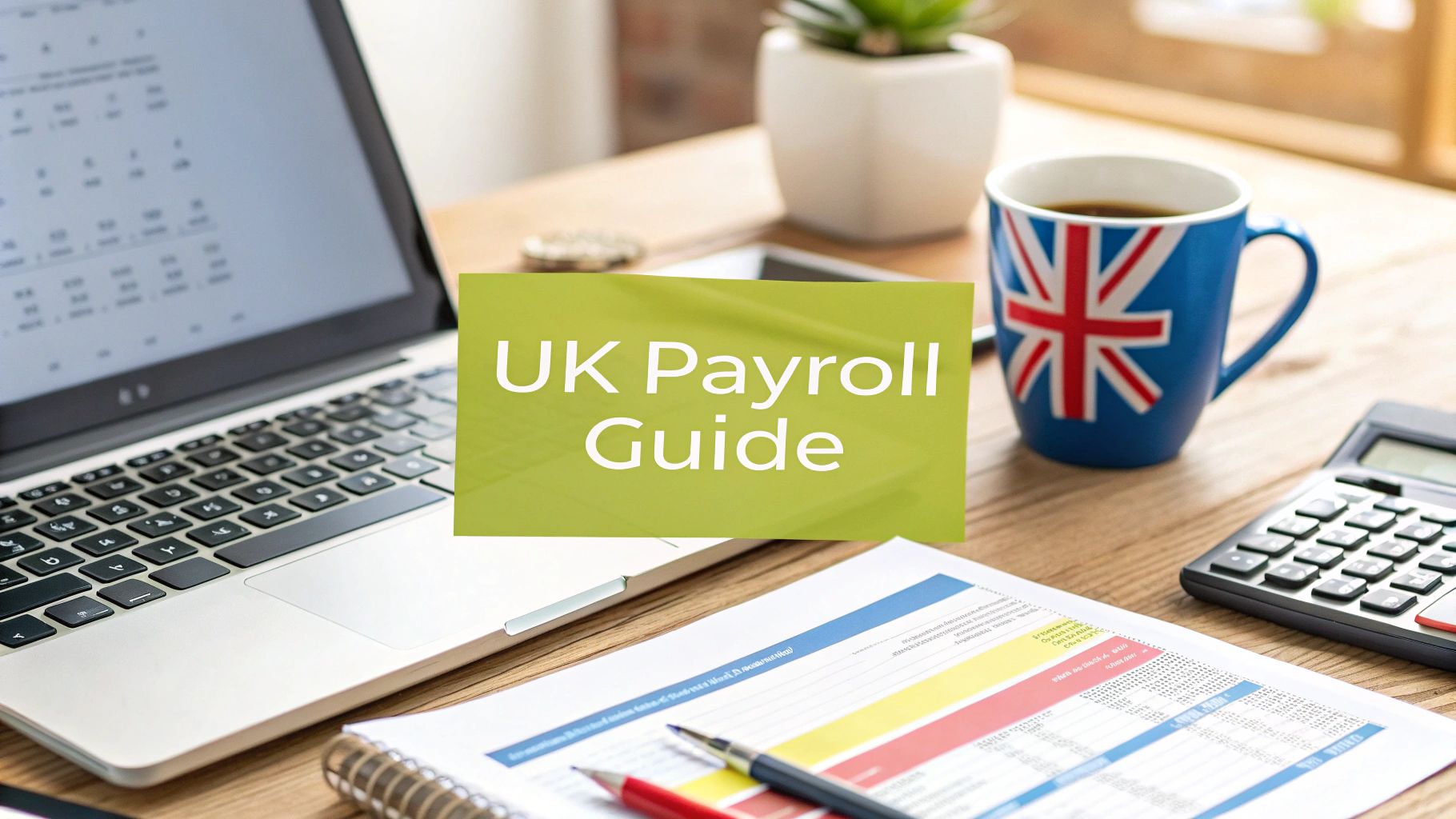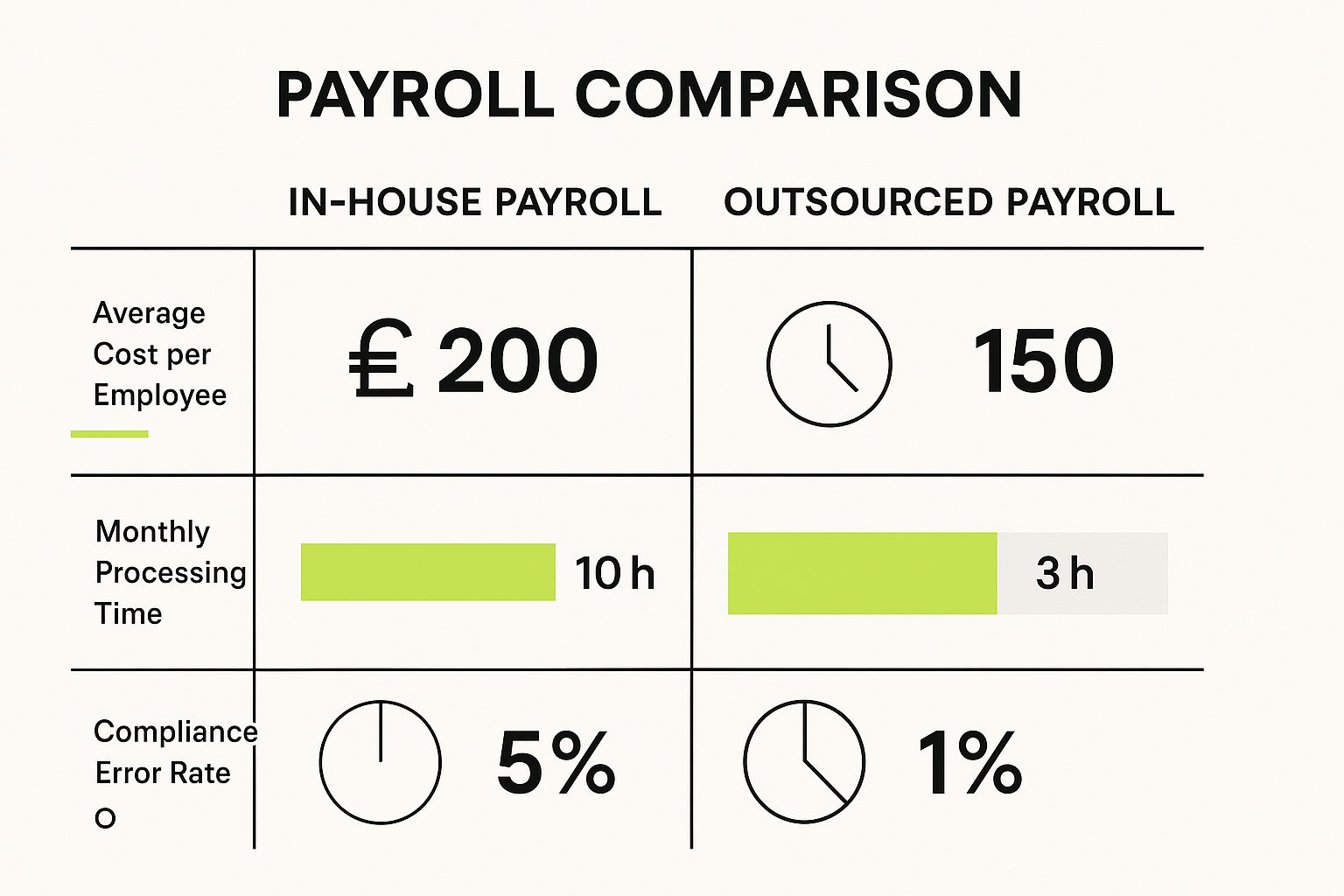
Let’s be honest, when you started your business, dealing with payroll probably wasn’t the part that got you excited. It’s often seen as just another task on a never-ending to-do list. But payroll is so much more than just sending money to your team; it's the hidden engine of your entire operation.
For most small business owners in the UK, it quickly becomes a massive headache, fraught with complicated rules and the very real risk of expensive mistakes. This is where professional payroll services for small businesses UK step in, taking the whole process off your plate so you can get back to what you do best—growing your business.
Imagine your business is a ship setting sail for new horizons. You're the captain, your eyes fixed on the destination: happy customers, healthy profits, and steady growth. But down below deck, there's a complex engine room that keeps everything moving forward. That’s your payroll. When it’s running like a well-oiled machine, your journey is smooth and powerful. If it starts to sputter, the whole ship can grind to a halt.
For UK businesses, that engine room is surprisingly intricate. It’s not a simple case of bank transfers. It’s a tangled web of tax legislation, pension auto-enrolment duties, and managing sensitive employee data, all of which demand meticulous attention to detail.
Many entrepreneurs kick things off by handling payroll themselves. It seems like a smart way to save a bit of cash, right? In reality, it often comes with a whole host of hidden costs. The first hit is the sheer amount of time it eats up. Every hour you spend wrestling with PAYE calculations, National Insurance contributions, and pension deductions is an hour you’re not spending on finding new clients, improving your product, or planning your next move.
Then there’s the serious risk of getting it wrong. One small slip-up or a missed deadline with HMRC can land you with some eye-watering fines and penalties, completely wiping out any money you thought you were saving. And let's not forget your team. Late or incorrect payslips can quickly erode trust and cause unnecessary stress, which is the last thing you need.
Modern payroll isn't just about paying people; it's a discipline of precision and compliance. A single mistake can create a domino effect, impacting your tax bill, your legal standing, and your team's morale. Getting it right isn't just important—it's essential for a healthy, sustainable business.
The burden of payroll is a big deal, especially when you look at the numbers. As of early 2025, there were around 5.45 million small businesses in the UK, and of those, about 1.38 million have staff on the payroll. The financial side is staggering, too. The average small business spends roughly £170,745 a year on staff costs. With that much money on the line, there’s simply no room for error.
This is precisely where dedicated payroll services for small businesses UK really show their value. They lift the weight of these complex, time-sapping tasks from your shoulders. By exploring professional payroll services, you can make sure your business’s engine runs smoothly, powering you forward without the constant worry of a costly breakdown.

When you run payroll in the UK, you’re not just paying your team. You're entering into a serious legal relationship with HM Revenue & Customs (HMRC). Think of it like this: anyone can own a car, but to drive it on the road you need a licence, insurance, and an MOT, and you have to obey the Highway Code. UK payroll has its own set of non-negotiable rules you simply have to follow.
Getting this right from day one is absolutely critical. With every payslip you issue, you’re effectively acting as an unpaid tax collector for the government. It’s a huge responsibility, and it involves several key duties that no small business can afford to ignore.
The whole system is built to make sure the government gets the correct tax and social security payments for everyone in employment. For a small business owner, this means getting your head around PAYE, National Insurance, and various statutory payments, each with its own rulebook.
At the heart of it all are a few key pillars. Understanding these is the first step to running a smooth, compliant payroll operation and keeping yourself out of trouble.
PAYE (Pay As You Earn) is the bedrock of the UK tax system. It’s how HMRC collects Income Tax and National Insurance directly from employees' wages. As an employer, you are legally obligated to calculate these amounts, deduct them from gross pay, and report everything to HMRC on or before each payday. This isn’t optional; it’s your fundamental duty.
National Insurance Contributions (NICs) are another crucial deduction. It’s a two-way street: both the employee and the employer have to pay. Employee NICs are taken from their salary, while employer NICs are an additional cost to your business, paid on top of the employee's wage. These payments fund vital state benefits like the NHS and the State Pension.
Think of your payroll obligations as a three-way agreement between you, your employee, and HMRC. You calculate what's owed, the employee contributes through deductions, and you ensure the correct amount reaches the tax authority on time, every time. Missing a payment or making a calculation error breaks this agreement and can lead to immediate penalties.
On top of these regular deductions, you’ll also need to handle statutory payments for staff in specific situations. These are payments mandated by law, including:
Each comes with its own complicated eligibility rules, calculation methods, and reporting requirements. This is where professional payroll services for small businesses UK really earn their keep, managing this complexity so your team always gets what they’re legally entitled to.
Perhaps the single biggest compliance headache for small businesses in recent years has been the introduction of workplace pensions, better known as auto-enrolment. This law forces every UK employer to put eligible staff into a pension scheme and contribute to it.
The Pensions Regulator is the government body that polices this, and they don't mess about. The rules are incredibly strict and the penalties for non-compliance are severe, including daily fines that can quickly spiral out of control. It's a common tripwire for businesses, who often fall foul of the law completely by accident.
As an employer, you’re responsible for:
Failing to comply can result in a £400 fixed penalty notice, followed by escalating daily fines that range from £50 to £10,000, depending on how many employees you have. This is precisely why solid pension management is a non-negotiable part of any decent payroll service. They take care of the assessments, calculations, and submissions, lifting a massive compliance burden right off your shoulders.
So, you've got your head around the complexities of UK payroll. The next big question is: how are you actually going to manage it all? For most small business owners, this decision really comes down to three main paths, and each one has its own set of pros and cons.
The right choice isn't universal; it hinges entirely on your business's reality. Things like your budget, the expertise you have on your team (or lack thereof), and where you see your business heading in the future will all play a part.
Think of it like planning a big trip. You could drive yourself, hire a chauffeur for the entire journey, or maybe just book a car for the trickiest parts of the drive. Each gets you to your destination, but the cost, effort, and overall experience are worlds apart. Let's break down your options.
First up is the do-it-yourself approach, where you handle payroll using dedicated software. This is you getting behind the wheel. The main draw here is the feeling of total control and, on the surface, lower costs. You're just paying for a software licence, not a full service fee.
But be warned, this road has a steep learning curve. You're on the hook for everything. That means entering data without a single slip-up, keeping on top of every little change to tax and pension laws, and making sure every single HMRC submission is perfect and on time. It demands a huge chunk of your most precious resource: your time.
The second path is to hand the whole thing over to a specialist payroll bureau or your accountant. This is your chauffeur service. You provide the raw data—hours worked, new hires, leavers—and a team of experts handles the rest. They'll run the calculations, generate payslips, deal with HMRC reporting, and manage your pension contributions.
The biggest win here? Peace of mind. You’re tapping into specialist knowledge, which massively cuts down the risk of getting compliance wrong. It frees you up to actually run your business. The trade-off, of course, is the ongoing service cost and giving up that hands-on control.
This image helps to show the difference it can make.

As you can see, outsourcing often saves a surprising amount of time and slashes the error rate, making the investment worthwhile purely by reducing risk and giving you your hours back.
Finally, you've got the hybrid or managed service model. This option is the sweet spot between DIY and full outsourcing, offering a smart balance of control and expert backup.
It usually works like this: you use the provider's software to input your payroll data, giving you full visibility, while their team works in the background to handle the complex compliance bits and final submissions. It’s an excellent middle ground for businesses that want to keep a hand in but need a professional safety net. If you're curious about how this blended support works, exploring the different financial and advisory services on offer is a great place to start.
To make the choice a bit clearer, let's lay out the options side-by-side.
This table breaks down the key differences between handling payroll in-house, outsourcing it completely, and using a managed service.
Ultimately, there's no single "best" option—only the best option for you.
Choosing the right path isn't just about the numbers; it's a strategic move that affects your time, your legal standing, and your capacity to focus on what you do best: growing your business. Weigh these options carefully to find the payroll approach that truly supports your journey.

When you're sifting through the different payroll services for small businesses in the UK, it's incredibly easy to get bogged down in the details. But a good service does much more than just pay your staff on time. Think of it less like a fancy calculator and more like a specialist team member you're bringing on board.
To pick the right one, you need a checklist of what really matters. These are the features that separate a basic, run-of-the-mill service from a great one – the ones that will save you time, keep you out of trouble, and actually help your business grow.
Let’s break down the absolute must-haves.
First things first, any service you consider has to be a master of UK compliance. This is the bedrock. If a provider gets this wrong, nothing else they offer is worth a thing.
Automated HMRC Submissions: The system absolutely must handle all your Real Time Information (RTI) submissions to HMRC without you lifting a finger. This means sending the Full Payment Submission (FPS) every single time you run payroll, and the Employer Payment Summary (EPS) when it’s needed. Getting this automated is your best defence against hefty late-filing penalties.
Integrated Pension Management: Auto-enrolment can feel like a minefield for small business owners. A top-notch service will take care of the whole process. That includes checking which employees are eligible each payday, working out the contributions, and sending reports to your pension provider. This isn't just a nice-to-have; it's your shield against massive fines from The Pensions Regulator.
Getting this side of things automated means you can stop worrying about every little change in legislation. You can trust that your payroll is right and filed on time, every time.
A truly great payroll service isn't just about making your life easier. It should also improve things for your team and slash your day-to-day admin. The key to this is a simple but powerful feature: an employee self-service portal.
This is a secure online space where your staff can log in and find their own information, 24/7, without having to bother you for it. It sounds simple, but it can dramatically cut down the number of questions you have to field every month.
You’ll want a portal that lets your team:
By giving your team the power to manage their own data, you claw back hours of admin time. It’s a classic win-win: they get instant answers, and you get more time to focus on running the business.
Finally, you need to think about the long game. The right payroll partner should be there for you today and be ready to grow alongside you tomorrow.
Responsive, UK-Based Support is vital. When you have a payroll question, especially an urgent one, you need to talk to someone who actually understands UK rules and can give you a straight answer, fast. Steer clear of providers that hide behind chatbots or take days to reply.
Robust Data Security is completely non-negotiable. You're handling incredibly sensitive information. Your provider must be fully GDPR compliant and use bank-grade security to protect your business and your employees from any potential data breaches.
Lastly, the service has to be scalable. As you take on more people, the system should handle the extra workload without creaking at the seams. The features and pricing should be able to grow with you, so you don't have to face the headache of switching providers just because your team has doubled in size.

When you start digging into payroll services for small businesses UK, it’s easy to get drawn in by the headline price. But to get your budget right, you need to look past the sticker price and understand the full picture. The real cost is rarely a single number; it's a blend of subscription fees, potential add-ons, and sometimes, a few unwelcome surprises.
It’s a bit like booking a budget flight. The initial fare looks like a steal, but once you’ve added luggage, picked your seat, and grabbed a coffee on board, the final bill tells a different story. Payroll services can work the same way, so knowing what to look for is the key to avoiding a shock.
First things first, let's get to grips with the common pricing structures. This will help you compare providers on a level playing field and figure out which model actually suits your business's cash flow and growth ambitions.
Most payroll providers in the UK stick to one of a few standard pricing models. Each has its own sweet spot depending on how big and how stable your team is.
Per-Employee, Per-Month (PEPM): This is the one you’ll see most often. You pay a small base fee, plus an extra charge for each employee on your payroll that month. For instance, a provider might charge a £10 base fee plus £4 per employee. It’s a great model because it's scalable – your costs grow predictably as you hire more people.
Flat Annual or Monthly Rate: Some services offer a single, all-in fee that covers a set number of employees for a fixed time. This is fantastic for budgeting because your costs are completely predictable. The only thing to watch out for is what happens if you hire more staff than your plan covers.
It's really no surprise that so many businesses are looking for this kind of reliable support. Around 66% of UK SMEs now outsource their payroll, and you can see why when you hear that a single pay run can take some professionals up to a week to finish by hand.
The real trick is spotting the potential hidden costs that aren’t always splashed across the homepage. These "extras" can inflate your bill pretty quickly if you're not paying attention. When you’re getting quotes, make it a point to ask about fees for these specific things.
A payroll provider's value isn't just in the price they quote, but in the problems they prevent. A transparent fee structure that covers all essentials is often cheaper in the long run than a low base rate with lots of expensive add-ons.
Keep an eye out for extra charges like:
Getting a handle on these costs is a fundamental part of managing your business's money. For a broader look at financial housekeeping, you might find our guide on tax advice for small businesses useful. By asking the right questions from the start, you can make sure the price you're quoted is the price you'll actually pay. It allows you to pick a partner based on their total value, not just a tempting headline rate.
Picking the right payroll partner is a huge decision, and it goes way beyond just finding someone to run your payslips. Think of it as hiring a specialist to look after the financial wellbeing of your team. The right choice frees you up to grow your business, but a poor one can lead to never-ending headaches. The trick is to turn this big choice into a simple, manageable process.
First things first, you need to look inward and figure out what your business actually needs. Are you a one-person-band director of a limited company who just needs a simple salary run? Or do you have a growing team with a mix of full-time and part-time staff, making pension auto-enrolment a top priority? Your specific situation will completely shape the level of service you’re looking for from any payroll services for small businesses UK.
Once you have a clear idea of your needs, you can set a realistic budget. This isn’t about just finding the cheapest price tag; it's about finding the best value. You have to consider the massive cost of getting payroll wrong.
Payroll mistakes are shockingly common. As of early 2025, reports showed over 90% of UK businesses were making errors every single month, and a quarter of all PAYE employees were getting paid incorrectly. These figures, highlighted in this UK PAYE employment report, show exactly why accuracy is king.
A reliable provider is a direct investment in preventing these kinds of expensive slip-ups.
With a shortlist of potential partners in hand, it’s time to do some digging. Your mission is to find a provider with a solid track record, bulletproof systems, and fantastic support.
Here are the key things to investigate:
And never, ever underestimate the power of social proof. Go looking for recent reviews and testimonials on independent websites. What are their current clients saying about their accuracy, their speed, and the overall service? A strong, positive reputation is often the clearest sign of a quality provider.
Once you’ve done your research, line up demos with your top two or three contenders. This is your chance to see their software in action and ask some tough questions. Treat it like a job interview – because, in a way, that's exactly what it is.
Before you make that final call, make sure you understand their onboarding process. A good payroll partner will make the switch completely seamless. They should have a clear, step-by-step plan for moving your existing data—all your employee details and year-to-date figures—without causing any disruption. They should also be there to help get your team set up on any new self-service portals.
Finally, get absolute clarity on all pension-related tasks. A great provider will handle all the fiddly calculations and submissions for you. To get a better sense of what’s involved, have a look at our guide on how to calculate employer pension contributions. Choosing a partner who makes this whole process simple is a decision you will be very glad you made down the line.
If you're a small business owner, payroll can feel like a world of its own. It’s completely normal to have questions. Getting straightforward answers is the key to making smart decisions, staying on the right side of HMRC, and keeping your costs in check.
Let’s tackle some of the most common queries we hear from businesses just like yours.
For a small team of 1-5 people, you'll find that payroll services for small businesses in the UK are surprisingly affordable. Most providers work on a simple per-employee, per-month model.
You can usually expect a small base fee, somewhere in the ballpark of £10-£25 a month. On top of that, there's a charge of about £4-£7 for each employee. So, if you have three employees, you might pay a £15 base fee plus £5 per person, bringing your total to just £30 for the month. It's a predictable cost that covers all the essentials like payslips and HMRC filings, saving you a massive headache and protecting you from costly mistakes.
Getting started is actually quite simple, but you’ll want to have a few key pieces of information ready to go. This just makes the whole process smoother and ensures everything is spot-on from day one.
You’ll need to pull together:
Having this information on hand really does speed things up. Any decent payroll provider will walk you through this list, making it feel less like a mountain of paperwork and more like a simple to-do list.
Absolutely. In fact, this is one of the biggest reasons to use a professional payroll service. They are experts at managing all sorts of employment arrangements.
This includes part-time staff on pro-rata salaries, team members on zero-hours contracts with fluctuating pay, and even freelancers who might fall under specific payment rules. The service will correctly calculate tax, National Insurance, and holiday pay based on the hours actually worked. It guarantees fairness and compliance, no matter how varied your team is. This is a vital part of your financial management, and you can get more great tips in our simplified guide to UK tax advice for small businesses.
This is a fantastic and critical question. When it comes down to it, the legal responsibility for accurate payroll and on-time submissions to HMRC always rests with you, the employer.
However—and this is a big however—your agreement with a reputable payroll provider will outline their professional liability. If they make a mistake that leads to a penalty, they are usually responsible for covering that cost. This is precisely why choosing an experienced, insured provider is so important. Think of it as your financial safety net.
Ready to take the complexity out of your payroll? GenTax Accountants offers expert, reliable payroll services designed for modern UK businesses. Get in touch today to see how we can give you peace of mind and more time to focus on growth.